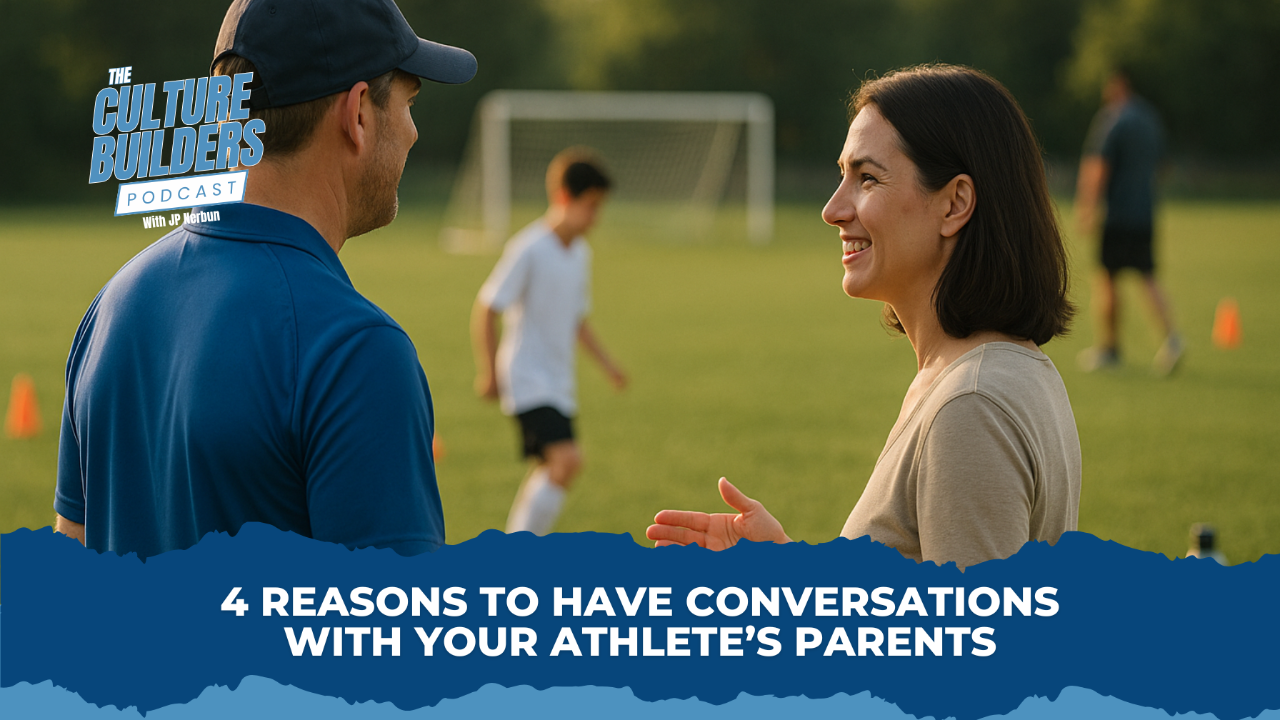4 Reasons to Have Conversations with Your Athlete’s Parents

Adapted from The Coach's Guide to Sports Parents
“Why isn’t my daughter playing more?!” The exclamation, not a genuine question, reverberated through legendary North Carolina soccer coach Anson Dorrance’s office the day after his team won a national championship. His explanation was useless. The father, enraged, kept pressing. Dorrance's wife, overhearing, noted he'd given the same reasoning ten different ways before the father stormed out, disappointment and anger unresolved.
Coaches often face similar, irrational encounters with sports parents. Whether it’s about playing time, disciplinary measures, conflicts with teammates, or a perception that you’re not doing enough for their child, these conversations are inevitable. While not every parent is irrational—many are simply concerned, and you may have even invited their questions—some, like Dorrance’s caller, are simply too entangled in their own narrative to listen.
One of the most challenging aspects of these situations is that "that parent" is often unaware of their own behavior. You might recognize their opening remarks in a text or email:
- “I’m not the kind of parent who contacts the coach, but…”
- “I really appreciate everything you do, but…”
- “I’ve been holding my tongue for as long as I can, but…”
- “My child asked me not to say anything, but…”
As Dorrance explained to his wife that evening, “This is what it’s like dealing with certain parents. They love their kids and don’t want them to suffer. It’s hard for them. But you cannot genuflect to their pressure.” What I admire about Dorrance is his ability to stand by his decisions while remaining open to these difficult discussions. He believes—as I do—that these conversations are essential. Given the high degree of discomfort they produce, why are they so crucial?
4 Reasons for Hard Conversations
- Demonstrate Care and Value Partnership. Conflict is a natural part of any relationship. Avoiding or prematurely ending a discussion due to discomfort isn't effective. By listening to a parent’s concerns, coaches genuinely show care for the athlete’s well-being and respect the parent’s perspective, even if you don't agree with their premise.
- Gain Valuable Insight into the Home Environment. There's often a significant disconnect between what parents perceive and what their children experience daily. Athletes might embrace their roles and commitments, while parents, not privy to daily communication, hold different viewpoints. Young athletes aren’t always the best communicators at home either. Engaging directly with parents can clarify these dynamics for them, and help coaches grasp the underlying family situation impacting the athlete.
- Promote a Healthy Team Culture. A coach who supports a healthy culture understands the difference between being right and being effective. You may be completely justified in your decisions and feel you shouldn't have to explain them. But what does "being right" achieve if a toxic parental narrative takes root within your team? Parents are integral to team culture. If they don’t share concerns with you directly, they will share them with others—their child, other parents, administrators. It’s far better to address these concerns head-on, allowing you to not only resolve issues but also identify areas for improvement to prevent future misunderstandings.
- Help Parents Grow. Parents often "don’t know what they don’t know." Every time a parent approaches you with an issue, you have an opportunity to coach them on what truly matters. When anger or frustration arise, ask, “What is your biggest concern for your child?” This often shifts the conversation to their child as a person, not just an athlete, potentially revealing deeper fears or anxieties. These conversations are vital opportunities to educate and support parents in a meaningful way, guiding them toward a healthier perspective on their child's development.
Do you want more ways to minimize parent issues and get them supporting you and the team? Get your copy of my book, The Coach’s Guide to Sports Parents, and check out The Working with Sports Parents Online Course.
Join Our Weekly Newsletter
The most practical insights on leadership and culture...
- 3 Minute Weekly Tools & Tips
- Notes to the Coaching Culture Podcast
- FREE Chapter of The Culture System
We hate SPAM. We will never sell your information, for any reason.


